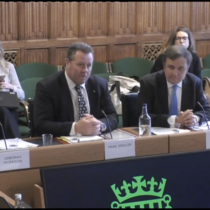A Pragmatic Approach to Transition is Vital to Exports
The Prime Minister’s speech in Florence rightly concentrated minds on a post-Brexit “transition” or interim deal between the UK and EU. But the questions remain of what happens not only if no such interim deal is agreed, but (even if it is) what would happen after the interim period has expired?
Worrying implications for Northern Ireland’s farmers
Thanks to a new report from Northern Ireland’s Livestock and Meat Commission, we now know that the answers for that sector are deeply worrying and have major lessons for UK industry as a whole. Indeed, this report should be welcomed by (and essential reading for) anyone who cares about post-Brexit trade policy.
That’s because, as the report makes clear, if the UK fails to agree a post-Brexit comprehensive free trade deal with the EU and instead reverts to World Trade Organization (WTO) trading conditions, the results would be devastating for Northern Irish farming.
The report is even more striking because it also projects that regardless of which of two WTO trading scenarios the UK adopts, Northern Irish beef and sheep meat exports to Europe would collapse dramatically.
The researchers found that in the most extreme scenario of a unilateral “Open-Door” trade policy (whereby the UK reduces its tariffs on imports from major agricultural producers but without any reciprocal agreements in place) Northern Irish beef and sheep meat output would decline by 21%, as exports to the EU fell by over 90%.
We need new arrangements that are robust and secure. If they can be negotiated and implemented in a faster timeframe then that should be welcomed.
However, the report also found that in the less extreme scenario of “WTO Equivalence” (whereby the UK and EU impose reciprocal tariffs on each other’s imports based on the current EU Common External Tariff, with the assumption that there would also be mutual recognition of veterinary and other technical standards), any short-term gains would be eroded by declining consumption in the longer-term due to higher prices, and exports to the EU would still fall by over 90%.
The report concludes that if an Open-Door trade policy was adopted, the viability of beef and sheep farming across large swathes of Northern Ireland would be seriously threatened, and this would have serious consequences for the wider rural economy.
Problems could spread to mainland British farmers
It is worth saying also that before anyone thinks that this would be a problem confined to Northern Ireland (and that mainland British agriculture would somehow be more resilient) it should be noted that WTO trading would freeze GB farming out of EU export markets, which would not only be detrimental to the beef industry but particularly damaging for sheep exports.
In other words, a switch to WTO trading conditions should clearly be avoided. That means the UK needs to avoid crashing out of the EU with no new comprehensive trade deal. And that means that we need to end talk of “no deal is better than a bad deal”.
Some constructive recommendations
So, what is to be done? Thankfully, the recent NI Livestock and Meat Commission report makes several constructive recommendations, the first and most timely of which is for the UK to seek interim Single Market (EEA) and Customs Union membership, but for a longer 5-year transition period that the Prime Minister proposes (along with mutual recognition of existing official controls such as veterinary standards).
Crucially however, the report calls for a mid-way review during this interim period, in order to examine whether enough progress has been made to bring forward or delay any final deal with the EU.
And it is this mid-way review which offers a potential way to square the circle of the Prime Minister’s call for a time-limited transition period, with the inevitable delays that may emerge on the road to Brexit.
That is because a two-year transition is far from likely to be enough time to not only negotiate and agree the finer points of any final deal, but to also develop and implement the necessary arrangements for facilitating frictionless cross-border trade such as sophisticated new IT systems.
Indeed, given the track record of previous Government IT projects, do we really think that all the new systems and infrastructure could be ready in two years? Would it not be sensible to have a longer transition period, with a mid-way review to check that the hard deadline was actually achievable?
Call for a 5 year transition with a 2 year review
Taking a more pragmatic approach, we are calling for the Prime Minister to modify her recent call for a 2-year transition, and instead make the 2 year mark the point of a mid-way review during a 5-year transition. We call it the 5-2 approach. What no-one wants is a hastily agreed solution containing loopholes that could leave our systems vulnerable to unanticipated, unscrupulous behaviour or unintended consequences that have a distorting impact on markets.
Ultimately, we need to avoid the WTO trading, and a longer transition may be vital to this, where the timescale is based specifically on the complexities of the negotiations and implementation. We need new arrangements that are robust and secure. If they can be negotiated and implemented in a faster timeframe then that should be welcomed.
The reality is that a “no deal scenario” remains a cliff edge for many businesses. Whilst a transition period is not only welcome but vital for sectors such as mine, without the longer period with the opportunity to extend the negotiations in the event of not reaching a deal, then it risks becoming a two-year stay of execution where we will struggle to mitigate the consequences of WTO conditions.







